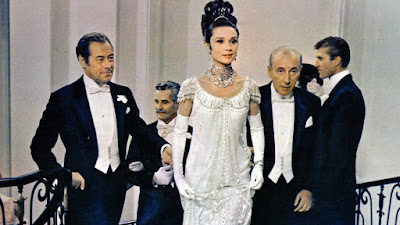Audrey Hepburn Through my Eyes: My Fair lady
I don’t believe I recall the first time I saw Audrey Hepburn
on the screen. However, I do recall owning a boxset of musicals. It still sits
on the shelf at my parent’s house; with its sleeve held together by sheer will
alone. It contains Seven Brides for Seven Brothers, Calamity Jane and My Fair
Lady. I have fond memories with Calamity Jane, with its overly cheerful music
and tomboyish main character. But I have even more fond memories of My Fair
Lady.
My Fair Lady was glamorous in every way. It has the most
beautiful art direction, the gowns, the cinematography. I remember the Ascott
opening scene, shot in one glorious take and all the women donned in black and
white dresses that seemed to be a mix between 60s fashion and Art Deco. This
whole scene serves to separate both Henry Higgins and Eliza Doolittle from the
exact group of people they are trying to fit in with. They aren’t stoic and
lifeless people who only care about their status like the rest of the people at
the Ascott – they have flaws and an identity. Proven by that glorious scene
where Eliza has a slip of the tongue whilst making small talk, separating her
from the high-class individuals. The core of this musical is identity over
appearances.
Many would say that Julie Andrews deserved to have the role
of Eliza Doolittle in the movie, seen as though she shone so brightly on stage.
However, I would beg to differ. Audrey Hepburn absolutely kills the
performance, her cockney accent and attitude being just hilarious enough to
make you smile but not so much that you feel it’s a parody. Her character comes
off as naïve and innocent to begin with but throughout you begin to understand
that she is just hopeful and far smarter than it seems. It’s a wonder that Rex
Harrison won an Oscar and she wasn’t even nominated.
You may know that Audrey’s singing was dubbed as her voice wasn’t
strong enough. This was in part due to her range being lower than the score. In
the end, Marni Nixon ended up recording the music, much to my dismay. Marni
Nixon is a wonderfully talented vocalist, however she failed to capture Eliza’s
essence through song. And when you compare Hepburn’s original recordings to Nixon’s
the difference is astounding. The original recordings are more down to earth,
perhaps more reflective of Eliza as a character, but struggled with some of the
harder sequences. The better option would have been to do additional vocal
training or to transcribe the music to fit her range. To think that if they had
chosen Julie Andrews they wouldn’t have had this problem, but then we wouldn’t
have the wonderful take on Eliza that Audrey portrays.
Alas, My Fair Lady became something I looked up to. I wanted
to sing the songs and wear the costumes. I wanted to be able to create
something as (almost) perfect as that. I became attached to the idea of
transformation. And the more I watched it the more I realised it wasn’t about
transformation but it was about keeping hold of what makes you who you are
At the time, I was a young lass, that’s how I was read and
treated. And for me, there was a sense of power that came from Eliza’s character.
All of Higgins’ songs were about reducing women to nothing and toting men as
superior. When you watch this, it’s so in your face that you know this is
supposed to be making it clear that Higgins is a bit of a dick. Then, when
compared to Eliza’s songs, it cements that train of thought. Her songs are all
about sticking up for herself and how she ‘don’t need no man’. She retains her
identity throughout, despite her change in appearances. And although she goes
back to Higgins it was her choice, and by her using her cockney accent to address
him it proves that she has the upper hand and she has never lost herself on the
journey. I read an article that said the words ‘choosing the man doesn’t make
My Fair Lady a sexist movie; it makes it a movie about a sexist time.’

Comments
Post a Comment